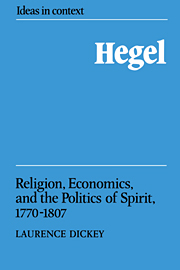Book contents
- Frontmatter
- Contents
- Preface
- Acknowledgments
- Introduction: Hegel in a Protestant cultural context
- Part I Hegel's Württemberg: “Civil Millenarianism” and the two faces of Protestant civil piety
- Part II Württemberg's Hegel: Applied theology and social analysis
- Part III Toward the Phenomenology: Sittlichkeit becomes a problem in social and political theory
- Epilogue: Bildung and politics: The “first class,” Christian pride, and “absolute spirit”
- Abbreviations
- Notes
- Index
Part I - Hegel's Württemberg: “Civil Millenarianism” and the two faces of Protestant civil piety
Published online by Cambridge University Press: 11 January 2010
- Frontmatter
- Contents
- Preface
- Acknowledgments
- Introduction: Hegel in a Protestant cultural context
- Part I Hegel's Württemberg: “Civil Millenarianism” and the two faces of Protestant civil piety
- Part II Württemberg's Hegel: Applied theology and social analysis
- Part III Toward the Phenomenology: Sittlichkeit becomes a problem in social and political theory
- Epilogue: Bildung and politics: The “first class,” Christian pride, and “absolute spirit”
- Abbreviations
- Notes
- Index
Summary
Every religion has some political opinion linked to it by affinity.
The spirit of man…will regulate political society and the City of God in uniform fashion; it will…seek to harmonize earth with heaven.
For the Americans the idea of Christianity and liberty are so completely mingled that it is almost impossible to get them to conceive of the one without the other.
…preachers in America are continually coming down to earth. Indeed they…are forever pointing out how religious beliefs favor freedom and public order, and it is often difficult to be sure… whether the main object of religion is to procure eternal felicity in the next world or prosperity in this.
Alexis de TocquevilleThe purpose of Part I of this study is to identify the religious and political threads of meaning that eighteenth-century Württemberg Protestants wove into a seamless web that had “meaning creating significance” for the culture of Old-Württemberg as a whole. The argument will be that this “web of signification” can be talked about in terms of the ideal of Protestant civil piety and that that ideal constituted the conceptual axis upon which discussion of religious and political matters in Old-Württemberg turned for most of the eighteenth century.
As has been noted, Württembergers borrowed from the theological anthropology of the Aufklärer to articulate this religiopolitical conception. There were, to be sure, many striking affinities between the Pelagianizing tendencies that were inherent in the Aufklärers' conception of homo religiosus and the requirements for citizenship that were implicit in the Württembergers' ideal of civil piety.
- Type
- Chapter
- Information
- HegelReligion, Economics, and the Politics of Spirit, 1770–1807, pp. 33 - 39Publisher: Cambridge University PressPrint publication year: 1987



